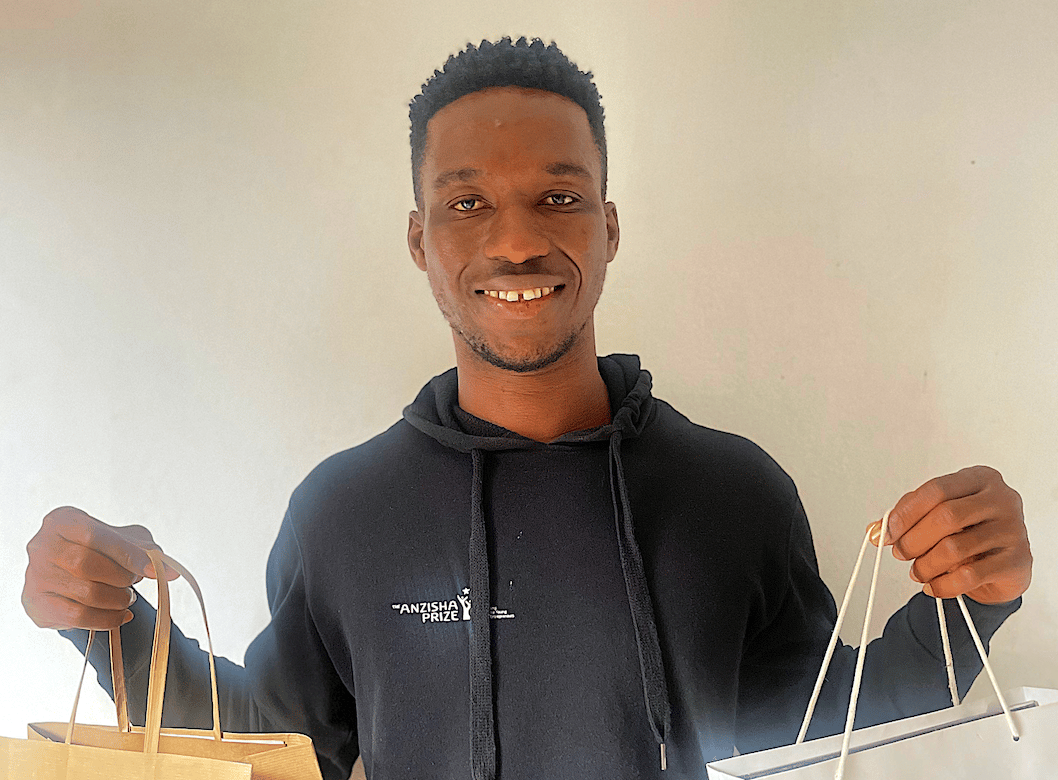An intrepid 22-year-old entrepreneur from Sierra Leone has founded an eco-friendly paper bag company – something he has kept at doggedly despite the challenges a developing economy can present.
TWO DIFFERENT SCENARIOS. ONE PRODUCT. Amadu Deen Bah was raised by a single mother in Freetown, Sierra Leone. He grew up helping her work as a small trader on weekends and holidays. At the age of 13, he sold bags by the side of the road.
Cut to now. He is the founder and CEO of Caballay Investment, an eco-friendly paper bag manufacturing company he set up in 2020 in the West African country, now trying to raise $75,000 to buy machines to automate the manufacturing process. His aim? To produce 1,000 bags a day and work towards ending the use of plastic bags.
Also an Anzisha Prize fellow in 2021, he has surely come a long way.
“Sometimes, your start is not that good – it’s difficult and hard. But the one thing I have learned on my journey is that it doesn’t matter if you start good or bad; just know that on the journey you will face difficulties. So, the time that you are facing difficulties is the time you need to show your character. You just need to be strong, to be focused, to keep going because the going will get you there. And don’t forget to read!” says Bah, summarizing his years as a novice starting up his entrepreneurial journey. He set out on this ride soon after high school, when he wanted to embark on a business instead of continuing with his education.
He met Jeremy Okoye, a businessman from Senegal, and decided to leave Sierra Leone, for the first time. While in Senegal, hungry and unable to speak either French or Wolof, he eventually found a temporary job in construction.
One day while wandering the streets, he saw a sign advertising English lessons – and thought that was something he could do. As luck would have it, his soon-to-be mentor Okoye was also there. He
began working for him.
When he decided to leave Senegal, Okoye gave him a laptop and books to motivate him. Plus, he had $1,000 in savings.
Back again in Sierra Leone, he was involved in the community clean-up on the last Saturday of every month, where citizens are encouraged to venture out and collect garbage.
“There are no local people to collect trash in my community. You have to wait for the bigger companies to collect it. So I saw it as a business opportunity.”
He wanted to recycle, but the initiative didn’t work out. Then, an idea struck him: what about paper bags? In three weeks, during August 2020, at the height of the Covid-19 pandemic, Bah learned to make paper bags and thereafter founded his company, Caballay Investments; the name Caballay the nickname his uncle gave his mom.
He found his first customer and second mentor in Sierra Leone, Rodney Hughes. The very first order was for 70 bags.
But Bah did not have the capital to get started on the order, so Hughes gave him some valuable business advice – “What you need to do first in business if you don’t have money to start is – always ask
your customer to give you a deposit.”
Bah worked day and night to deliver and soon began acquiring more customers. In the meantime, the Anzisha Prize had always inspired him, so he applied, and at 21, he made the shortlist.
But then, there were setbacks in store. One morning, a heavy downpour caused flooding, and he lost all his wares.
He gave up for three months, taking on only bits of work.
But he read about a character who faced adversity, and sitting in the shade of a tree, the character said to himself “after all this long work, if I give up, what will it give me”.
And so Bah resolved to start in earnest again. He saved money, sold his bed, and even sold stickers. He was granted $1,000 through the Anzisha Prize Fellowship in 2021, and made $5,000 through the Tony Elumelu Foundation. He wanted to use the money to set up an office and expand, but there were still many curveballs to resolve– he bought the wrong materials to make paper bags, and during Covid-19, prices went up.
He used the power of networking, and found that hotels use paper bags the most, and so began marketing mainly in that direction, also supplying them handmade to supermarkets, fashion stores, stationery shops, printing presses and restaurants.
Today, he is set to build on his learnings and make a difference to the circular economy. His piece of advice? “You need to have passion for what you do, and a love for learning. After every failure, there is another opportunity.” And he isn’t shy of admitting his mistakes as a young businessman. He has relied on feedback from customers to scale up his business and bag every opportunity in his way.
